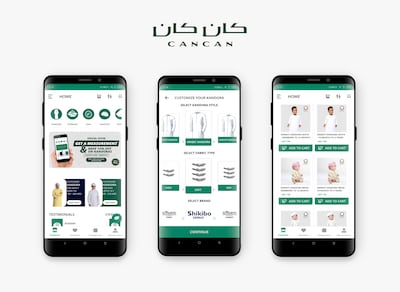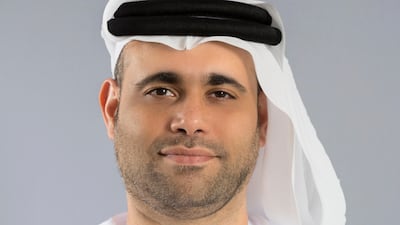For Emirati Saleh Hamed, shopping for kanduras has always been a stressful experience.
From finding the right tailor and choosing the right fabrics, to the never-ending rails of white material, Hamed often found that his shopping trips threw up more questions than they answered.
“I’ve never found kandura shopping to be the nicest experience,” Hamed tells The National.
“I tend to be a very discerning customer, I like to know what I'm paying for. But often I would find that people couldn’t tell me why one kandura cost Dh250 and another cost Dh150, when on the surface they looked very similar. I just felt like things could be done better.”
After speaking to some of his friends, he realised he was not alone in his thinking. “I remember when I first started wearing kanduras, I'd have friends who were non-national, and they would ask about my kanduras and I’d tell them: ‘why don't you make one?’ but then them taking the step of going to a tailor, especially if they don't speak the language, for example, or even if they did, it can be a difficult and off-putting experience.”
As a result, the idea for CanCan was born. Hamed, who co-founded the app with Mohamed Al Jneibi, Yaqoob Al Shehhi and Khalid Al Hashimi, used his background in computer science to develop an app that not only simplifies the kandura experience, it revolutionises it.
CanCan is the world’s first platform in the traditional menswear market to use AI technology. Using body scanning imagery, CanCan takes accurate measurements through a smartphone camera, taking into account factors such as weight, height and age. These measurements can then be shared with its partner tailors to create a made-to-measure kandura that will be delivered to the customer's door within four days of purchase.
Hamed believes that CanCan will streamline the process of shopping for kanduras and open up the market too.
“Take women for example, they are not able to go to a tailor to buy kanduras for their husbands or sons, but they can order through our app,” he says. “And not only that, but a lot of these tailors are small, local and family run businesses, a lot of them do not have an online presence and are not reaching new customers.
“If there’s a tailor in Sharjah for example who is doing something new with his kandura designs, it’s unlikely a customer from Abu Dhabi would hear about it or make the journey. But we can offer that service for them through CanCan.”
CanCan also hopes to expand into other countries in the region and around the world, helping to connect customers with styles and garments native to their country that they might not be able to find in tailors where they live.
“If we could offer a service for people to order authentic styles and designs from home, that we know will fit perfectly and be delivered in a few days, it could really help people to feel connected,” Hamad says. “And not only that, we want to reach new markets too. We're taking the kandura to the world, basically, to anybody in the world. And I think it will help to build new relationships and new pathways, and new opportunities for cultures to meet.”
CanCan has a big focus on sustainability, with the hopes of prolonging the lifecycle of kanduras.
“Sustainabily is a key objective,” Hamad says. “We are a start-up right now, but as we grow, we want to tackle some of the things about the market that we are not happy with. What we want to do is have a unique ID for every single kandura that we make, to trace it through its life and then have a programme that allows people to give their kanduras back when they are done with them, and we'll refurbish them to a certain degree, and then we'll give them to less fortunate people or reuse the materials for other things.”
Sultan Al Darmaki, chairman of Al Darmaki Group, was one of the early investors in the start-up.
“CanCan is living proof that homegrown ideas and concepts work in the UAE and internationally, and can be a catalyst for others to take risks and explore new territory," he says. "The team is harnessing innovation to deliver a product that is integral to our culture in a way that suits today’s fast-paced lifestyles and consumers’ increasing reliance on technology. I am delighted to be part of this exciting new venture, and to promote growth among young, forward-thinking entrepreneurs."
UAE currency: the story behind the money in your pockets
All or Nothing
Amazon Prime
Four stars
Company%20Profile
%3Cp%3E%3Cstrong%3ECompany%20name%3A%3C%2Fstrong%3E%20Cargoz%3Cbr%3E%3Cstrong%3EDate%20started%3A%3C%2Fstrong%3E%20January%202022%3Cbr%3E%3Cstrong%3EFounders%3A%3C%2Fstrong%3E%20Premlal%20Pullisserry%20and%20Lijo%20Antony%3Cbr%3E%3Cstrong%3EBased%3A%3C%2Fstrong%3E%20Dubai%3Cbr%3E%3Cstrong%3ENumber%20of%20staff%3A%3C%2Fstrong%3E%2030%3Cbr%3E%3Cstrong%3EInvestment%20stage%3A%3C%2Fstrong%3E%20Seed%3C%2Fp%3E%0A
AWARDS
%3Cp%3E%3Cstrong%3EBest%20Male%20black%20belt%3A%20%3C%2Fstrong%3ELucas%20Protasio%20(BRA)%3Cbr%3E%3Cstrong%3EBest%20female%20black%20belt%3A%20%3C%2Fstrong%3EJulia%20Alves%20(BRA)%3Cbr%3E%3Cstrong%3EBest%20Masters%20black%20belt%3A%3C%2Fstrong%3E%20Igor%20Silva%20(BRA)%3Cbr%3E%3Cstrong%3EBest%20Asian%20Jiu-Jitsu%20Federation%3A%3C%2Fstrong%3E%20Kazakhstan%3Cbr%3E%3Cstrong%3EBest%20Academy%20in%20UAE%3A%20%3C%2Fstrong%3ECommando%20Group%2C%20Abu%20Dhabi%3Cbr%3E%3Cstrong%3EBest%20International%20Academy%3A%3C%2Fstrong%3E%20Commando%20Group%2C%20Abu%20Dhabi%3Cbr%3E%3Cstrong%3EAfrican%20Player%20of%20the%20Year%3A%20%3C%2Fstrong%3EKatiuscia%20Yasmira%20Dias%20(GNB)%3Cbr%3E%3Cstrong%3EOceanian%20Player%20of%20the%20Year%3A%20%3C%2Fstrong%3EAnton%20Minenko%20(AUS)%3Cbr%3E%3Cstrong%3EEuropean%20Player%20of%20the%20Year%3A%3C%2Fstrong%3E%20Rose%20El%20Sharouni%20(NED)%3Cbr%3E%3Cstrong%3ENorth%20and%20Central%20American%20Player%20of%20the%20Year%3A%20%3C%2Fstrong%3EAlexa%20Yanes%20(USA)%3Cbr%3E%3Cstrong%3EAsian%20Player%20of%20the%20Year%3A%20%3C%2Fstrong%3EZayed%20Al%20Katheeri%20(UAE)%3Cbr%3E%3Cstrong%3ERookie%20of%20the%20Year%3A%3C%2Fstrong%3E%20Rui%20Neto%20(BRA)Rui%20Neto%20(BRA)%3C%2Fp%3E%0A
The five pillars of Islam
Dhadak 2
Director: Shazia Iqbal
Starring: Siddhant Chaturvedi, Triptii Dimri
Rating: 1/5
More from Rashmee Roshan Lall
Profile of Tamatem
Date started: March 2013
Founder: Hussam Hammo
Based: Amman, Jordan
Employees: 55
Funding: $6m
Funders: Wamda Capital, Modern Electronics (part of Al Falaisah Group) and North Base Media
The specs
Engine: 2.0-litre 4cyl turbo
Power: 261hp at 5,500rpm
Torque: 405Nm at 1,750-3,500rpm
Transmission: 9-speed auto
Fuel consumption: 6.9L/100km
On sale: Now
Price: From Dh117,059
Infiniti QX80 specs
Engine: twin-turbocharged 3.5-liter V6
Power: 450hp
Torque: 700Nm
Price: From Dh450,000, Autograph model from Dh510,000
Available: Now
SPECS
%3Cp%3E%3Cstrong%3EEngine%3C%2Fstrong%3E%3A%202-litre%20direct%20injection%20turbo%20%0D%3Cbr%3E%3Cstrong%3ETransmission%3C%2Fstrong%3E%3A%207-speed%20automatic%20%0D%3Cbr%3E%3Cstrong%3EPower%3C%2Fstrong%3E%3A%20261hp%20%0D%3Cbr%3E%3Cstrong%3ETorque%3C%2Fstrong%3E%3A%20400Nm%20%0D%3Cbr%3E%3Cstrong%3EPrice%3C%2Fstrong%3E%3A%20From%20Dh134%2C999%26nbsp%3B%3C%2Fp%3E%0A
More from Neighbourhood Watch:
'The Batman'
Stars:Robert Pattinson
Director:Matt Reeves
Rating: 5/5
MATCH INFO
Uefa Nations League
League A, Group 4
Spain v England, 10.45pm (UAE)
SPECS
%3Cp%3E%3Cstrong%3EEngine%3A%3C%2Fstrong%3E%206-cylinder%203-litre%2C%20with%20petrol%20and%20diesel%20variants%3Cbr%3E%3Cstrong%3ETransmission%3A%20%3C%2Fstrong%3E8-speed%20automatic%3Cbr%3E%3Cstrong%3EPower%3A%3C%2Fstrong%3E%20286hp%20(petrol)%2C%20249hp%20(diesel)%3Cbr%3E%3Cstrong%3ETorque%3A%20%3C%2Fstrong%3E450Nm%20(petrol)%2C%20550Nm%20(diesel)%3Cbr%3E%3Cstrong%3EPrice%3A%20%3C%2Fstrong%3EStarting%20at%20%2469%2C800%3Cbr%3E%3Cstrong%3EOn%20sale%3A%20%3C%2Fstrong%3ENow%3C%2Fp%3E%0A
RESULTS
Bantamweight: Victor Nunes (BRA) beat Azizbek Satibaldiev (KYG). Round 1 KO
Featherweight: Izzeddin Farhan (JOR) beat Ozodbek Azimov (UZB). Round 1 rear naked choke
Middleweight: Zaakir Badat (RSA) beat Ercin Sirin (TUR). Round 1 triangle choke
Featherweight: Ali Alqaisi (JOR) beat Furkatbek Yokubov (UZB). Round 1 TKO
Featherweight: Abu Muslim Alikhanov (RUS) beat Atabek Abdimitalipov (KYG). Unanimous decision
Catchweight 74kg: Mirafzal Akhtamov (UZB) beat Marcos Costa (BRA). Split decision
Welterweight: Andre Fialho (POR) beat Sang Hoon-yu (KOR). Round 1 TKO
Lightweight: John Mitchell (IRE) beat Arbi Emiev (RUS). Round 2 RSC (deep cuts)
Middleweight: Gianni Melillo (ITA) beat Mohammed Karaki (LEB)
Welterweight: Handesson Ferreira (BRA) beat Amiran Gogoladze (GEO). Unanimous decision
Flyweight (Female): Carolina Jimenez (VEN) beat Lucrezia Ria (ITA), Round 1 rear naked choke
Welterweight: Daniel Skibinski (POL) beat Acoidan Duque (ESP). Round 3 TKO
Lightweight: Martun Mezhlumyan (ARM) beat Attila Korkmaz (TUR). Unanimous decision
Bantamweight: Ray Borg (USA) beat Jesse Arnett (CAN). Unanimous decision
The specs
- Engine: 3.9-litre twin-turbo V8
- Power: 640hp
- Torque: 760nm
- On sale: 2026
- Price: Not announced yet
Milestones on the road to union
1970
October 26: Bahrain withdraws from a proposal to create a federation of nine with the seven Trucial States and Qatar.
December: Ahmed Al Suwaidi visits New York to discuss potential UN membership.
1971
March 1: Alex Douglas Hume, Conservative foreign secretary confirms that Britain will leave the Gulf and “strongly supports” the creation of a Union of Arab Emirates.
July 12: Historic meeting at which Sheikh Zayed and Sheikh Rashid make a binding agreement to create what will become the UAE.
July 18: It is announced that the UAE will be formed from six emirates, with a proposed constitution signed. RAK is not yet part of the agreement.
August 6: The fifth anniversary of Sheikh Zayed becoming Ruler of Abu Dhabi, with official celebrations deferred until later in the year.
August 15: Bahrain becomes independent.
September 3: Qatar becomes independent.
November 23-25: Meeting with Sheikh Zayed and Sheikh Rashid and senior British officials to fix December 2 as date of creation of the UAE.
November 29: At 5.30pm Iranian forces seize the Greater and Lesser Tunbs by force.
November 30: Despite a power sharing agreement, Tehran takes full control of Abu Musa.
November 31: UK officials visit all six participating Emirates to formally end the Trucial States treaties
December 2: 11am, Dubai. New Supreme Council formally elects Sheikh Zayed as President. Treaty of Friendship signed with the UK. 11.30am. Flag raising ceremony at Union House and Al Manhal Palace in Abu Dhabi witnessed by Sheikh Khalifa, then Crown Prince of Abu Dhabi.
December 6: Arab League formally admits the UAE. The first British Ambassador presents his credentials to Sheikh Zayed.
December 9: UAE joins the United Nations.
What can victims do?
Always use only regulated platforms
Stop all transactions and communication on suspicion
Save all evidence (screenshots, chat logs, transaction IDs)
Report to local authorities
Warn others to prevent further harm
Courtesy: Crystal Intelligence
What is graphene?
Graphene is a single layer of carbon atoms arranged like honeycomb.
It was discovered in 2004, when Russian-born Manchester scientists Andrei Geim and Kostya Novoselov were "playing about" with sticky tape and graphite - the material used as "lead" in pencils.
Placing the tape on the graphite and peeling it, they managed to rip off thin flakes of carbon. In the beginning they got flakes consisting of many layers of graphene. But as they repeated the process many times, the flakes got thinner.
By separating the graphite fragments repeatedly, they managed to create flakes that were just one atom thick. Their experiment had led to graphene being isolated for the very first time.
At the time, many believed it was impossible for such thin crystalline materials to be stable. But examined under a microscope, the material remained stable, and when tested was found to have incredible properties.
It is many times times stronger than steel, yet incredibly lightweight and flexible. It is electrically and thermally conductive but also transparent. The world's first 2D material, it is one million times thinner than the diameter of a single human hair.
But the 'sticky tape' method would not work on an industrial scale. Since then, scientists have been working on manufacturing graphene, to make use of its incredible properties.
In 2010, Geim and Novoselov were awarded the Nobel Prize for Physics. Their discovery meant physicists could study a new class of two-dimensional materials with unique properties.
Quick pearls of wisdom
Focus on gratitude: And do so deeply, he says. “Think of one to three things a day that you’re grateful for. It needs to be specific, too, don’t just say ‘air.’ Really think about it. If you’re grateful for, say, what your parents have done for you, that will motivate you to do more for the world.”
Know how to fight: Shetty married his wife, Radhi, three years ago (he met her in a meditation class before he went off and became a monk). He says they’ve had to learn to respect each other’s “fighting styles” – he’s a talk it-out-immediately person, while she needs space to think. “When you’re having an argument, remember, it’s not you against each other. It’s both of you against the problem. When you win, they lose. If you’re on a team you have to win together.”
More on animal trafficking
In numbers: China in Dubai
The number of Chinese people living in Dubai: An estimated 200,000
Number of Chinese people in International City: Almost 50,000
Daily visitors to Dragon Mart in 2018/19: 120,000
Daily visitors to Dragon Mart in 2010: 20,000
Percentage increase in visitors in eight years: 500 per cent
Martin Sabbagh profile
Job: CEO JCDecaux Middle East
In the role: Since January 2015
Lives: In the UAE
Background: M&A, investment banking
Studied: Corporate finance
The%20specs
%3Cp%3E%3Cstrong%3EEngine%3A%3C%2Fstrong%3E%201.8-litre%204-cyl%20turbo%0D%3Cbr%3E%3Cstrong%3EPower%3A%20%3C%2Fstrong%3E190hp%20at%205%2C200rpm%0D%3Cbr%3E%3Cstrong%3ETorque%3A%3C%2Fstrong%3E%20320Nm%20from%201%2C800-5%2C000rpm%0D%3Cbr%3E%3Cstrong%3ETransmission%3A%20%3C%2Fstrong%3ESeven-speed%20dual-clutch%20auto%0D%3Cbr%3E%3Cstrong%3EFuel%20consumption%3A%3C%2Fstrong%3E%206.7L%2F100km%0D%3Cbr%3E%3Cstrong%3EPrice%3A%3C%2Fstrong%3E%20From%20Dh111%2C195%0D%3Cbr%3E%3Cstrong%3EOn%20sale%3A%20%3C%2Fstrong%3ENow%3C%2Fp%3E%0A
Prophets of Rage
(Fantasy Records)
FIVE%20TRENDS%20THAT%20WILL%20SHAPE%20UAE%20BANKING
%3Cp%3E%E2%80%A2%20The%20digitisation%20of%20financial%20services%20will%20continue%3C%2Fp%3E%0A%3Cp%3E%E2%80%A2%20Managing%20and%20using%20data%20effectively%20will%20become%20a%20competitive%20advantage%3C%2Fp%3E%0A%3Cp%3E%E2%80%A2%20Digitisation%20will%20require%20continued%20adjustment%20of%20operating%20models%3C%2Fp%3E%0A%3Cp%3E%E2%80%A2%20Banks%20will%20expand%20their%20role%20in%20the%20customer%20life%20through%20ecosystems%3C%2Fp%3E%0A%3Cp%3E%E2%80%A2%20The%20structure%20of%20the%20sector%20will%20change%3C%2Fp%3E%0A
Mina Cup winners
Under 12 – Minerva Academy
Under 14 – Unam Pumas
Under 16 – Fursan Hispania
Under 18 – Madenat
MANDOOB
%3Cp%3EDirector%3A%20Ali%20Kalthami%3C%2Fp%3E%0A%3Cp%3EStarring%3A%20Mohammed%20Dokhei%2C%20Sarah%20Taibah%2C%20Hajar%20Alshammari%3C%2Fp%3E%0A%3Cp%3ERating%3A%204%2F5%3C%2Fp%3E%0A%3Cp%3E%3C%2Fp%3E%0A



